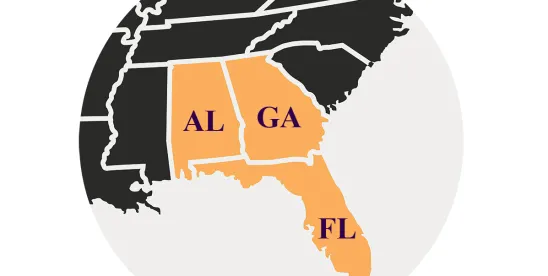After keeping us waiting with baited breath for several years, the Eleventh Circuit finally broke its silence – issuing its long-anticipated ruling in Gil v. Winn-Dixie Stores, holding that websites are not covered as places of public accommodation under Title III of the Americans with Disabilities Act (“Title III” or “ADA”). In doing so, the Court reversed and vacated the district court’s decision finding that defendant, Winn-Dixie Stores, violated Title III by failing to maintain a website that is accessible to individuals, who are blind or have low vision.
Unfortunately, to the extent that businesses, individuals, and disability rights advocates were hoping that this decision would help provide some much needed definitive guidance in this area of the law, they are all undoubtedly disappointed. While the decision should diminish plaintiffs’ abilities to successfully mount website accessibility challenges against certain types of businesses/websites in the Eleventh Circuit, it does little to immediately change the current state of the law at the national level.
Notwithstanding, the collective 61-page majority and dissenting opinions, do contain additional analysis into this ever-developing area. Below are three critical takeaways from this long-awaited decision, as well as our thoughts in looking ahead.
Takeaway #1: According to the Eleventh Circuit, Websites Are Not Places of Public Accommodation Under The ADA
The majority opinion reached its decision by adopting an extremely strict interpretation of the ADA – diverging from many district and appeals courts in other circuits – holding that websites do not qualify as “places of public accommodation” (“PPA”) under Title III, and accordingly, the plaintiff’s inability to access the site, in and of itself, is not a Title III violation.
As drafted, Title III applies to PPA, which, as the Court correctly notes, are expressly defined as physical, tangible, places, like retail stores, hotels, restaurants, and theaters. Notwithstanding the ADA’s examples of PPA, to date, a number of courts in other Circuits have nevertheless found that businesses must make their websites accessible under Title III, by utilizing one of two theories:
-
the “spirit of the law” theory, which posits that, because the ADA is a broad-reaching civil rights law meant to provide individuals with disabilities with full and equal access to various facets of society, it follows that the ADA must be read to evolve as society and technology evolve, and websites offering goods and services to the public are the modern equivalents of many of the brick and mortar PPA defined in the original text and regulations governing the ADA and, therefore, access must be provided; or
-
the “nexus” theory, which provides that websites that have a “nexus” to physical PPA, must be accessible to individuals with disabilities, because they are an extension of the goods/services/amenities being offered by the clearly-covered PPA.
Here, the majority outright rejected the “spirit of the law” approach as being contrary to the plain and unambiguous text of the ADA and, moreover, chose not to adopt the “nexus” theory (prevalent in the Ninth Circuit’s decision in Robles v. Domino’s), noting it was not something that had been previously followed in the Eleventh Circuit.
Instead, the Eleventh Circuit held that the impetus is on Congress to amend the ADA if its protections should be extended to websites, and absent Congress broadening the definition of PPA to include websites, it declined to “extend ADA liability to the facts presented to [it] here.”
Takeaway #2: The Eleventh Circuit Entertains an Alternative Theory of Potential Liability Under Title III, But Finds That It Still Doesn’t Result in Winn-Dixie’s Website Violating Title III
Having rejected the two theories noted above, the Appellate Court adopted an alternative, “third” theory of liability – the “intangible barrier” theory. Specifically, the Court held that if a website is inaccessible to individuals with disabilities, that website would violate Title III only where it creates an “intangible barrier” to accessing goods/services in a physical, brick and mortar location. The Court found that the inaccessibility of Winn-Dixie’s website did not present an “intangible barrier,” because it has a “limited use;” it is not the sole access point to the company’s stores, and it does not prevent the plaintiff from enjoying or accessing the goods/services that Winn-Dixie offers in its stores. (Indeed, the Court noted that the plaintiff had admittedly shopped at one of Winn-Dixie’s stores for years before he brought his lawsuit). Critically, the Court noted that Winn-Dixie’s website does not allow users to make purchases on the site; to the contrary, any purchases are made at the stores, and it held that anything a user could do on the website, it could also do at the stores.
Importantly, the majority was not swayed by the plaintiff’s arguments that the website’s inaccessibility forced him to confront additional inconveniences that individuals without disabilities, who could use the website, would not encounter (e.g., longer in-person wait times to pick up medications; inability to independently access coupons at home), and rejected his contention that these inequities denied him full and equal enjoyment of the grocery store or met the “intangible barrier” test.
Takeaway #3: This Decision’s Implications Are Limited
Ultimately, while this decision is sure to garner a significant amount of coverage, and does certainly make it harder to bring website accessibility claims under the ADA in the Eleventh Circuit, for the near-term future, it is unlikely to have a significant impact on this area of the law at a national level.
Although the majority held that Winn-Dixie did not violate Title III by maintaining an inaccessible website, it took great care to mention more than once that the fact that the website did not contain an e-commerce component linked to the store was a factor in reaching its decision.
Undoubtedly, the decision provides businesses with ammunition to aggressively fight back against cases filed in the Eleventh Circuit where: (i) a business is cyber-only and entirely unconnected to a physical PPA; or (ii) the website in question is predominantly informational and does not contain an e-commerce component. Given that a significant number of website accessibility lawsuits and demand letters continue to emanate from Florida, this should provide relief to Florida businesses that fit into one of these two categories.
As noted above, the Eleventh Circuit’s decision is inconsistent with those in several other circuits and district courts, and accordingly, is unlikely to deter plaintiffs from simply switching forums and asserting claims in jurisdictions that have adopted more pro-plaintiff theories of the law, such as New York, Massachusetts, Vermont, or California, where Title III and/or state/local law currently require accessible websites.
Looking Ahead
Plaintiff’s counsel in this case has vowed to appeal to the Supreme Court. While the Supreme Court previously rejected Domino’s efforts to seek review of its case in the Ninth Circuit, it is possible that the tension between the two cases will finally be enough for the Court to grant certiorari.
Separately, while recent efforts over the past six months have proven unsuccessful, there is bipartisan interest among some members of Congress to amend the ADA to expressly address digital accessibility. Similarly, we anticipate that if Congress confirms Kristen Clarke to serve as the head of the U.S. Department of Justice’s Civil Right Division (“DOJ”), DOJ’s Disability Rights Section is apt to work with the U.S. Access Board to reignite prior efforts under the Obama Administration to promulgate and adopt federal regulations governing website and mobile application accessibility. Interested parties should keep an eye out for announcements of such developments this July around the anniversary of the ADA and will, of course, report on any such announcements.
In the interim, as we’ve noted for years, the best way to currently avoid falling prey to website accessibility lawsuits like Gil v. Winn-Dixie Stores and Robles v. Domino’s’s is to achieve substantial conformance with the Web Content Accessibility Guidelines (“WCAG”) 2.1 Levels A and AA (as confirmed via human-based auditing from both the code and user perspectives), maintain internal digital accessibility policies and corporate governance procedures, include website accessibility obligations in all contracts with third-party vendors, provide training to relevant employees regarding developing, operating, and maintaining an accessible website, and ensure that these efforts are ongoing, and not simply one-time efforts.





 />i
/>i
